Who Really Was the Biblical Elijah? by Israel Drazin; Gefen Publishing House; (c) 2020; ISBN 9789657-023280; 141 pages, $19
By Rabbi Dr. Michael Leo Samuel

 CHULA VISTA, California — Of all the prophetic figures that adorn the narrative of the Hebrew Bible, few have seized the Judaic imagination as powerfully as the prophet Elijah, whose very name declares, “YHWH is my God.” Virtually every Jew—regardless of age—has heard of Elijah, whose presence inspired the “Cup of Elijah” ritual seen at every Passover celebration. Elijah’s name is also evoked in the Havdalah ceremony in a special prayer expressing our hope that Elijah will be the precursor of the Messianic Era.
CHULA VISTA, California — Of all the prophetic figures that adorn the narrative of the Hebrew Bible, few have seized the Judaic imagination as powerfully as the prophet Elijah, whose very name declares, “YHWH is my God.” Virtually every Jew—regardless of age—has heard of Elijah, whose presence inspired the “Cup of Elijah” ritual seen at every Passover celebration. Elijah’s name is also evoked in the Havdalah ceremony in a special prayer expressing our hope that Elijah will be the precursor of the Messianic Era.
Yet, for all the legendary stories surrounding this enigmatic personality. We wonder: Who was he outside his prophetic role? What kind of psychological profile could we make based on the literature associated with his name?
To his immense credit, my dear friend and colleague, Rabbi Dr. Israel Drazin presents us with a lucid description of Elijah, the man.
Drazin’s insightful work “Who Really Was the Biblical Elijah?” peels back the layers of this enigmatic figure, offering readers a rich and engaging portrait. The book’s title hints at a distinction between the Elijah of the Bible and the Elijah of rabbinical legend and folklore. Despite its concise 141 pages, the book’s depth and breadth of scholarship leave an impression of a much more extensive work.
Drazin structures his book thoughtfully. The introduction, afterword, index, and contents—with 17 clearly titled chapters—navigate through a landscape populated by figures such as Ahab, Jezebel, Malachi, Elisha, and the Messiah, as well as delving into 15 legends about Elijah.
The book is divided into four parts, first introducing Elijah as “the Tishbite,” possibly from a city within the boundaries of Naphtali or as an inhabitant of Gilead in Northern Israel. Drazin intriguingly suggests that Elijah might have been a non-Israelite who adopted the worship of the God of Israel, proposing that “Tishbite” could be a corruption of “toshavi,” meaning a settler, a term for non-Israelites residing in Israel.
In a particularly compelling chapter, Drazin compares Elijah with another zealous figure from the Torah—Pinchas. He explores the rabbinical tradition that identifies Elijah as Pinchas, known for his violent zealotry. This identification, while speculative, draws parallels between the archetypal personalities of the two figures. Drazin examines the various perspectives on this identification, from the Midrashim that grant Pinchas a long life and later the name Elijah, to the rationalistic views of commentators like ibn Ezra and Radak, who question or reject this connection.
Personally, I have always found the comparison of Elijah and Pinchas intriguing. Rabbi Drazin may be examining the mystical and psychological elements that connect these two biblical figures, as both figures represent zealotry in service of the divine. Jewish mystical tradition holds that Elijah is the reincarnation (gilgul) of Pinchas, interpreting their shared fervor for God’s commandments as evidence of an ongoing soul mission across lifetimes. This doctrine of gilgul hanefesh, or “transmigration of souls,” posits that souls return to fulfill uncompleted tasks or to rectify past actions. In this view, Elijah’s later life continues the purpose and fervor of Pinchas, showing an evolution of the same spiritual mission from one life to the next.
From a Jungian perspective, Elijah and Pinchas can also be seen as expressions of a shared archetype: the “zealous warrior” or “holy zealot,” who is committed to defending sacred values, often through radical or aggressive means. Jung’s concept of archetypes, which are inherited, universal symbols or patterns, suggests that the psychological traits seen in Pinchas and Elijah manifest a deeper, collective pattern in the psyche, embodying humanity’s fascination with figures who fight for divine justice.
In this sense, both reincarnation and archetypal psychology serve to highlight how certain qualities—like zealotry or a singular devotion to a cause—transcend individual lifetimes or personas, appearing across generations or cultures in the form of recurring characters, stories, and values. The gilgul of Pinchas into Elijah provides a mystical continuity, while Jungian archetypes offer a psychological parallel, suggesting these figures resonate across time as symbols of unwavering commitment to a higher moral or spiritual purpose. This synthesis of Jewish mysticism and Jungian psychology can deepen our understanding of these biblical characters as religious figures and embodiments of universal ideals.
The book also addresses the complex issue of religious zealotry, a theme with historical resonance in Jewish history and beyond. Drazin references Josephus, the first-century Jewish historian, who reinterprets Pinchas not as a zealot but as a pragmatic man forced to act to save his nation—a reinterpretation likely aimed at discouraging zealotry against Rome. Bear in mind that the rabbis blamed the downfall of Judea on the zealots, who thought they were modern-day Maccabees!
Drazin’s psychological exploration of Elijah is particularly novel. He probes into Elijah’s character, questioning whether his zealousness for God may have overshadowed his sensitivity to human suffering. The book contemplates Elijah’s actions, such as reviving the widow’s son, and whether they stemmed from compassion or obligation.
Elijah’s impatience with religious hypocrisy is highlighted as one of his defining traits. He challenged his people to choose decisively between God and Baal, a narrative Drazin suggests has contemporary relevance for American Jews navigating the intersection of faith and politics.
In conclusion, Rabbi Drazin’s book is not just an academic exploration but a timely discourse on the dangers of religious fanaticism. It resonates across faiths and cultures, urging a conversation on the balance between zeal and humanity. Rabbi Drazin’s “Who Really Was the Biblical Elijah?” is a profound contribution to the study of biblical characters, offering insights that are as relevant today as they were in Elijah’s day.
*
Rabbi Dr. Michael Leo Samuel is spiritual leader of Temple Beth Shalom in Chula Vista.